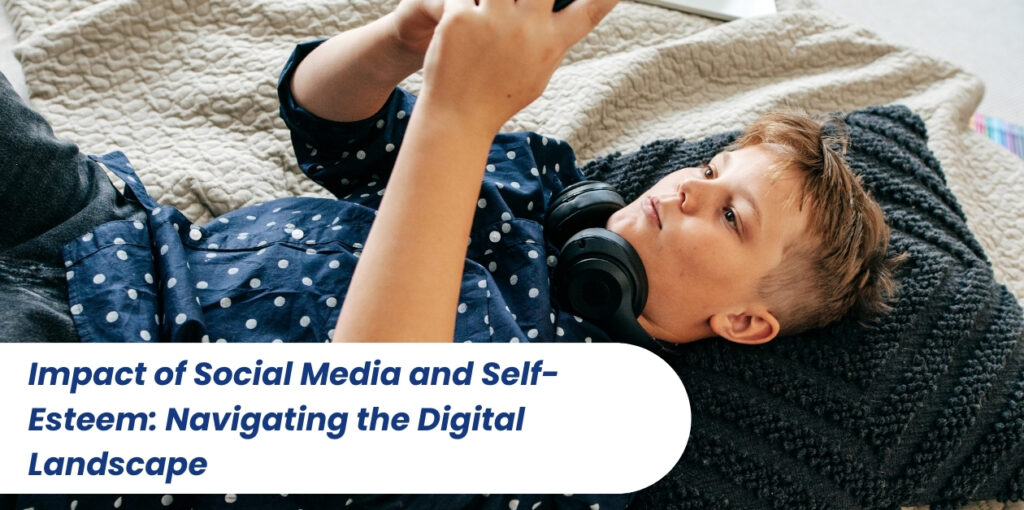Impact of Social Media and Self-Esteem: Navigating the Digital Landscape

In today’s digital age, social media has become an integral part of our daily lives. Platforms like Instagram, Facebook, Twitter, and TikTok connect us to friends and family, keep us informed, and allow us to express ourselves creatively. However, the impact of social media on self-esteem has raised significant concerns among psychologists, educators, and users alike. This blog explores how social media influences our self-esteem, the potential pitfalls, and strategies for navigating this complex digital landscape.
The Double-Edged Sword of Social Media
Social media serves as a double-edged sword when it comes to self-esteem. On one hand, it offers numerous benefits, such as fostering connections and providing a platform for self-expression. On the other hand, it can lead to feelings of inadequacy, comparison, and anxiety. Understanding these opposing effects is crucial for users to harness the positive aspects while mitigating the negatives.
Positive Aspects of Social Media
- Connection and Community: Social media can create a sense of belonging. Users often find communities that share their interests, values, or struggles. This support network can boost self-esteem by providing validation and encouragement.
- Self-Expression and Creativity: Many users find joy in sharing their talents and thoughts online. Whether it’s through art, writing, or photography, self-expression can enhance feelings of self-worth and identity.
- Access to Resources: Social media platforms are filled with motivational content, educational resources, and mental health support. Engaging with this positive content can uplift spirits and encourage personal growth.
The Dark Side of Social Media
Despite these benefits, the negative impact of social media on self-esteem cannot be ignored:
- Comparison Culture: Social media often promotes an unrealistic portrayal of life. Users may find themselves comparing their behind-the-scenes to others’ highlight reels, leading to feelings of inadequacy and low self-worth.
- Cyberbullying and Negative Feedback: The anonymity of social media can foster bullying and harsh criticism. Negative comments can deeply affect a person’s self-esteem, especially for vulnerable individuals.
- Addiction and Dependency: The quest for likes, shares, and followers can lead to an unhealthy dependence on social media validation. This dependency can create a rollercoaster of emotions based on online interactions.
- Fear of Missing Out (FOMO): Seeing friends and peers participate in events or experiences can lead to feelings of exclusion and inadequacy. FOMO can exacerbate anxiety and impact self-esteem.
The Research Behind Social Media Impact
Numerous studies have examined the relationship between social media use and self-esteem. Research has found that heavy social media use is correlated with lower self-esteem, particularly among adolescents. A 2017 study published in the American Journal of Preventive Medicine found that increased social media use was associated with an increase in feelings of isolation and depression.
Moreover, research has shown that the way individuals engage with social media can significantly influence their self-esteem. For instance, passive consumption—scrolling through feeds without interacting—has been linked to lower self-esteem, whereas active participation, such as posting content and engaging with others, tends to have a more positive impact.
Strategies for Navigating Social Media and Self-Esteem
Given the complex relationship between social media and self-esteem, it is essential to develop strategies for healthier engagement. Here are some practical tips:
- Curate Your Feed
Take control of your social media experience by following accounts that promote positivity and authenticity. Seek out creators who share relatable content, inspire you, or provide valuable insights. Conversely, unfollow accounts that trigger negative feelings or comparison.
- Limit Usage
Set boundaries for your social media use. Designate specific times for checking your feeds and consider taking regular breaks. This can help reduce feelings of overwhelm and the urge to constantly compare yourself to others.
- Focus on Real-Life Connections
While social media can foster connections, it’s essential to prioritize real-life interactions. Spend time with friends and family offline to build meaningful relationships that can boost your self-esteem.
- Practice Mindfulness
Engage in mindfulness practices to cultivate self-awareness and self-acceptance. Mindfulness can help you recognize negative thoughts and feelings related to social media use and counter them with positive affirmations.
- Reflect on Your Emotions
When you find yourself feeling low after using social media, take a moment to reflect. Ask yourself what triggered these feelings. Understanding your emotional responses can empower you to make more informed choices about your social media engagement.
- Seek Support
If social media significantly impacts your self-esteem, consider talking to a mental health professional. Therapy can provide tools and strategies to navigate these feelings and develop a healthier relationship with social media.
Conclusion
As social media continues to evolve, its impact on self-esteem remains a pressing issue. By understanding the benefits and drawbacks, users can navigate this digital landscape more mindfully. Curating your feed, limiting usage, focusing on real-life connections, practicing mindfulness, and seeking support can empower you to harness the positive aspects of social media while protecting your self-esteem. Ultimately, it’s about finding a balance that works for you, allowing you to enjoy the connections and creativity social media offers without compromising your mental well-being.
For Additional Support
If you or someone you know is struggling with mental health issues exacerbated by social media, consider reaching out to a professional. To learn more about support options, visit Pi Health Cancer Hospital or book an appointment here. Your mental well-being matters, and help is available.
About Author
Dr. Deepti Raj Kommu
M.B.B.S. MD Psychiatry, M.Med. (Family Medicine)
Dr. Deepti Raj Kommu is a dedicated and experienced psychiatrist committed to providing exceptional mental health care. Her comprehensive approach, combining clinical expertise, research, and community engagement, ensures that patients receive the highest quality of care. Dr. Raj continues to make significant contributions to the field of psychiatry, improving the lives of individuals and promoting mental well-being in the community.

